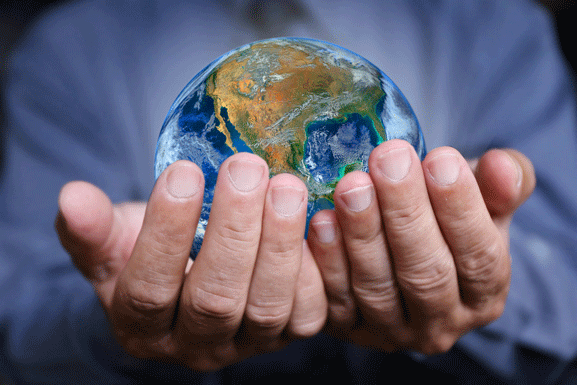Using Technology to Combat Climate Change

Ocean waters are warming and becoming more acidic, ice caps are melting, and sea levels are rising. Warmer global temperatures affect our water supplies, agriculture, power and transportation systems, the natural environment, and even our own health and safety.
Multiple studies published in peer-reviewed scientific journals show that 97 percent or more of actively publishing climate scientists agree 1: Climate-warming trends over the past century are mostly due to human activities.
While technology has played its part in causing climate change it can also help us get to solutions. Here are five initiatives taking place in the technology community that can fight climate change:
 1. Data centers
1. Data centers
The world’s most influential companies including Apple, NIKE, IKEA, Johnson & Johnson, and Starbucks, representing over US $1 trillion in annual revenue, are committed to 100% renewable power. Much of the energy used in data centers is not from the actual technology. Instead, it’s from cooling the servers. As well as delivering on emission reduction goals, renewable power can help manage fluctuating energy costs, improve reputation and provide energy security. It also shows business leadership on climate change. This could have massive impact if paired alongside robust government policy that boosts confidence and enables long-term investments.
2. Mobile apps
It takes some digging to find apps that will help you create real change on a daily basis, but they’re out there. Here are some examples of apps that can help you monitor and reduce your carbon footprint and waste:
-
- Oroeco is an app that tracks your carbon footprint by placing a carbon value on everything you buy, eat, and do, and then shows you how you compare with your neighbors.
- PaperKarma is an easy way to cut paper waste. Take a photo of your junk mail, send it through the app, and PaperKarma will figure out what it is and take you off the mailing list.
- GiveO2 tracks your carbon footprint as you travel. Turn on the tracker when you start a new trip, and it will automatically calculate a timeline of your carbon usage. At the end, you can “offset” it by supporting a sustainable project of your choice.
 3. IoT
3. IoT
Monitoring our energy usage makes it possible to be smarter about it. Take Nest, for instance. While an un-programmed thermostat can waste 20% of heating and cooling, Nest tackles the issue with a smart thermostat that learns your patterns and automatically adjusts to save energy. The Internet of Things can save energy and carbon footprints with things as simple as using an app to turn off the lights or with apps like IFTTT, which hooks up to many different types of systems. The IoT can also involve monitoring your sprinkler system to save water, or use sensors to tell you to take a different route when driving to avoid idling in traffic and wasting gas.
4. Open source movement
Open data and open source technologies are a huge way to accelerate environmental research and innovation. Take Tesla, for example. By opening the company’s patents to everyone, Elon Musk wanted to make sure electric vehicles succeeded faster.
5. Mapping
Interactive maps really drive home the point of climate change and can lead the way to remedies. Map layers defining vegetation, soil type, geology, precipitation, and human infrastructure can help model and plan for future change. New mapping technology can make us safer and less reliant on fossil fuels. The U.S Geologic Survey’s 3D Elevation Program is being developed to use advanced mapping to better update hazard maps for floods and earthquakes and find out where the best areas for solar and wind farms.
As you can see, many of these things only require small changes from individuals in order to make a difference for our climate. Some will require much more intentional decisions from businesses. The good news, however, is that with this intentionality, individuals and corporations alike can take action to help our climate. If we’re all in this together, perhaps it’s time that we take a look – individually and corporately – at how we can make a difference.
1. J. Cook, et al, “Consensus on consensus: a synthesis of consensus estimates on human-caused global warming,” Environmental Research Letters Vol. 11 No. 4, (13 April 2016); DOI:10.1088/1748-9326/11/4/048002
Categories
Search
Blog Categories
Related Resources
Archives
- July 2024
- June 2024
- May 2024
- April 2024
- March 2024
- January 2024
- October 2023
- September 2023
- August 2023
- July 2023
- June 2023
- May 2023
- April 2023
- March 2023
- February 2023
- January 2023
- October 2022
- July 2022
- June 2022
- May 2022
- April 2022
- March 2022
- February 2022
- January 2022
- December 2021
- November 2021
- October 2021
- September 2021
- August 2021
- July 2021
- June 2021
- May 2021
- April 2021
- March 2021
- February 2021
- January 2021
- December 2020
- November 2020
- October 2020
- September 2020
- August 2020
- July 2020
- June 2020
- May 2020
- April 2020
- March 2020
- February 2020
- January 2020
- December 2019
- November 2019
- October 2019
- September 2019
- August 2019
- July 2019
- June 2019
- May 2019
- April 2019
- March 2019
- February 2019
- January 2019
- December 2018
- November 2018
- October 2018
- September 2018
- August 2018
- July 2018
- June 2018
- May 2018
- April 2018
- March 2018
- February 2018
- January 2018
- December 2017
- November 2017
- October 2017
- September 2017
- August 2017
- July 2017
- June 2017
- May 2017
- April 2017
- March 2017
- February 2017
- January 2017
- December 2016
- November 2016
- October 2016
- September 2016
- August 2016
- July 2016
- June 2016
- May 2016
- March 2016
- February 2016
- January 2016
- December 2015
- October 2015
- September 2015
- August 2015
- July 2015
- June 2015
- May 2015
- April 2015
- March 2015
- February 2015
- January 2014
- February 2013




